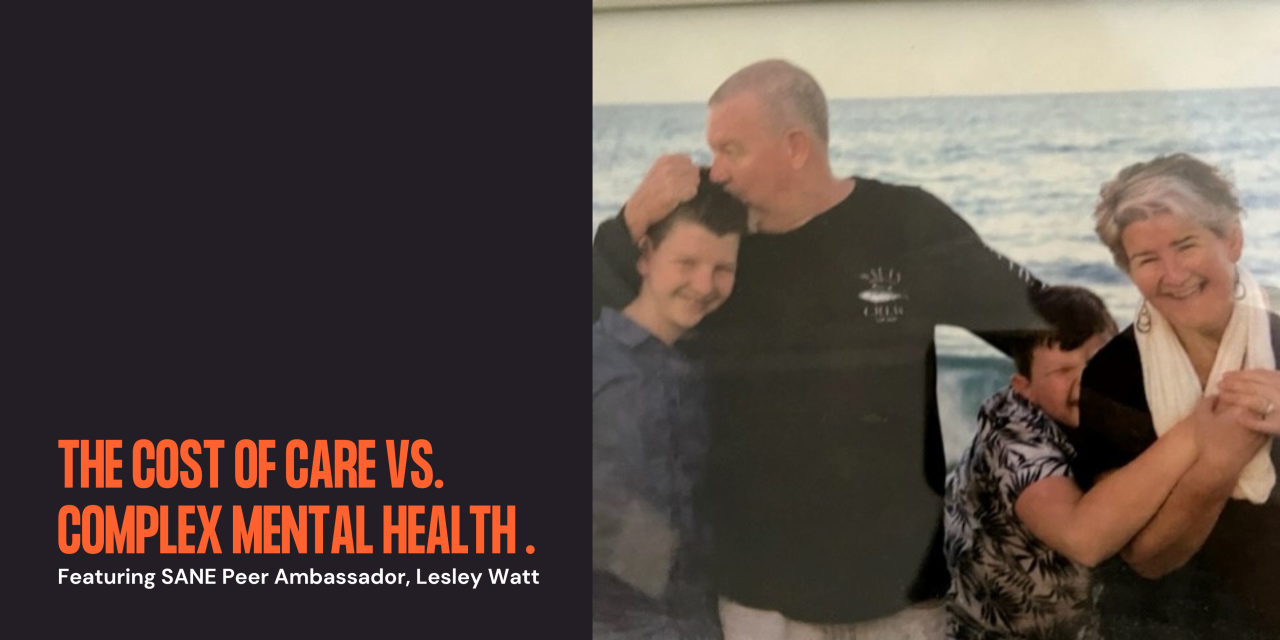The SANE Blog
The cost of care vs. complex mental health
Lesley is a SANE Peer Ambassador with a lived experience of complex mental health. SANE spoke to NSW resident Lesly about her experience in managing her health in the lead up to Mental Health Awareness Month 2023.
Lesley Watts, 52, lives in Dharug and Gundungurra land in the Blue Mountains at Winmalee. She lives with her husband of 17 years, two teenage boys – Iggy and Graysen and two cats. After growing up in the Mountains Lesley left in her late teens but returned to create her home and the support networks which together make up her life.
My husband is my primary source of support. When we met, I was very unwell, although at the time I was undiagnosed. He saw through all those times with zero judgement, and pure care.
I have a group of friends that I have known since I was 16 years old who have seen me through all stages of my mental health journey. While I don’t see them all the time, when we do catch up, it is very much like putting on a comfy pair of jeans – comfortable, and secure. I know that if I need anything, I can ask.
Lesley carefully manages her lifestyle and wellbeing, along with her budget, to help cope with her complex mental health conditions.
Obviously, medications and psychology sessions are a key out of pocket expense. I have always hated being dependent on anyone, and so independence and financial strength has always been a priority for me. Because I have a good safety network, my husband, and this has held me in good stead
However, before I was with my husband when I was much younger, I had bouts of homelessness and financial stress. During a previous abusive relationship I was unable to manage my health and financial obligations.
Feelings of loneliness and isolation have also been part of Lesley’s journey.
Loneliness and isolation is real. Even with loving and caring relationships, I often feel alone, and the reality is that no-one can ‘fix’ me except me. That is both empowering but also isolating. While I derive inspiration from others who achieve with complex mental health, it doesn’t make me feel better knowing others suffer too. It doesn’t lessen my personal burden knowing others go through it too – it just highlights to me that each experience is unique, circumstantial and complex.
Lesley says something changed in regard to her ability to manage her ill health when she became a parent.
After my first child, I experienced post-natal depression and that natural resilience dissipated. In early 2013, all of my symptoms ‘came together’ and I could no longer hide or cover my mental health. I could no longer effectively function at work or as a mother. I know this isn’t the same experience for everyone, but for me, the diagnosis was empowering. It brought all my experiences together and finally everything made sense.
That was empowering because then I could get the right treatment, I could focus on the right things, and I could truly tell my story.
I am very proud to say I am a Peer Ambassador for SANE. I try to explain that I focus on my complex mental health conditions, and everyone needs there own unique combination of support, research and advocacy.
While my contributions have been modest, I know that I am contributing to something extraordinarily important and relevant, and that is a wonderful feeling. Being part of an organisation like SANE helps me feel like I am giving back to the community and supporting the important discussion around complex mental health.
Getting the right professional and dealing with out-of-pocket expenses is something Lesley has to manage ongoing.
I definitely have a lot to balance with out-of-pocket expenses and care. I don’t think anyone is immune to this. For me, the issue is the ongoing nature of it. Usually I can prioritise these costs, for a time, but eventually other priorities kick in, sometimes resulting in postponing or cancelling sessions because we have other bills to pay. This is very tempting when we are ‘doing well’ or feel we are on track and then it seems very quickly those sessions drop off, sometimes creating new vulnerabilities.
SANE provides a range of free telephone and online support services for people over 18 years of age with complex mental health needs and their family, friends and carers. We offer different types and levels of support so you can find what works for you. Choose from counselling, peer support, online groups and events, 24/7 community forums, and online information and resources. Learn more at sane.org/get-support.
When you subscribe to the blog, we will send you an e-mail when there are new updates on the site so you wouldn't miss them.
